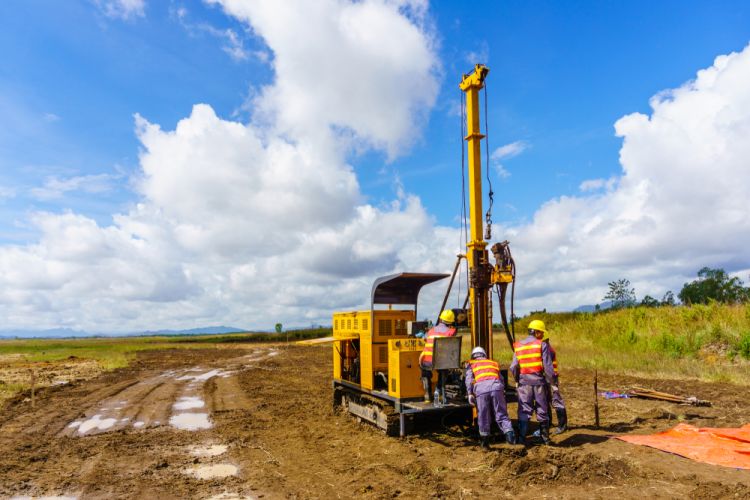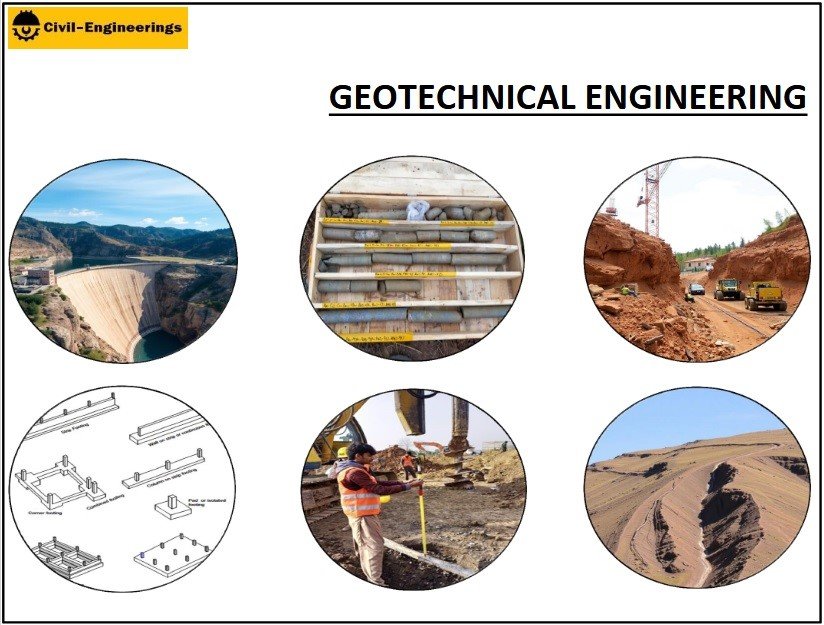Specialized Geotechnical Engineering Solutions Things To Know Before You Buy
Specialized Geotechnical Engineering Solutions Things To Know Before You Buy
Blog Article
Not known Incorrect Statements About Specialized Geotechnical Engineering Solutions
Table of ContentsThe Best Strategy To Use For Specialized Geotechnical Engineering SolutionsGetting The Specialized Geotechnical Engineering Solutions To WorkThe smart Trick of Specialized Geotechnical Engineering Solutions That Nobody is DiscussingThe Ultimate Guide To Specialized Geotechnical Engineering Solutions
They conduct site investigations, gather examples, execute laboratory tests, and examine information to review the viability of the ground for construction projects. Based on their findings, geotechnical engineers provide recommendations for foundation design, slope security, preserving frameworks, and reduction of geotechnical threats. They work together with various other specialists, such as engineers, architectural designers, and building and construction groups, to make sure that geotechnical factors to consider are integrated into the overall project design and execution.
Structure Layout: Geotechnical designers play a crucial function in creating structures that can securely sustain the designated structure. They evaluate the soil conditions and load requirements to figure out the proper foundation type, such as superficial structures (e.g., grounds), deep foundations (e.g., piles), or specialized techniques like dirt renovation. They take into consideration aspects such as settlement limits, bearing ability, and soil-structure communication to establish optimal structure styles.
Some Known Facts About Specialized Geotechnical Engineering Solutions.
Right here are some kinds of geotechnical engineers: Structure Engineer: Structure engineers concentrate on developing and assessing foundations for frameworks - Specialized Geotechnical Engineering Solutions. They evaluate the dirt conditions, tons needs, and site features to identify one of the most appropriate structure kind and design, such as superficial structures, deep foundations, or specialized methods like heap foundations
They do field testing, accumulate examples, and evaluate the accumulated data to characterize the dirt homes, geologic developments, and groundwater conditions at a site. Geotechnical Instrumentation Engineer: Geotechnical instrumentation engineers focus on surveillance and measuring the habits of dirt, rock, and frameworks. They install and preserve instrumentation systems that keep an eye on variables such as soil settlement, groundwater levels, slope motions, and architectural variations to assess performance and offer very early cautions of possible concerns.
In the office environment, geotechnical engineers use specialized software program devices to execute calculations, create designs, and evaluate data. Specialized Geotechnical Engineering Solutions. They prepare reports, testimonial job requirements, connect with customers and staff member, and coordinate task tasks. The workplace setup gives a helpful setting for study, evaluation, and cooperation with various other experts included in the job
They often go to project sites to conduct website examinations, examine geotechnical problems, and gather data for evaluation. These visits entail taking a trip to various places, in some cases in remote or challenging surfaces. Geotechnical designers may carry out soil tasting, conduct examinations, and screen construction activities to ensure that the geotechnical facets of the job are being executed correctly.
A Biased View of Specialized Geotechnical Engineering Solutions
Geotechnical engineers additionally function in specialized geotechnical labs. In these facilities, they perform experiments, carry out examinations on soil and rock examples, and evaluate the engineering residential properties of the materials. Geotechnical lab engineers work thoroughly in these atmospheres, dealing with testing tools, operating instruments, and tape-recording information. They collaborate with various other lab staff to make sure accurate and reputable testing results.
Retaining Walls: Producing wall surfaces that hold back dirt to stop landslides and provide security on sloped surfaces. Embankments and Earthworks: Designing embankments for roads, railways, and dams to guarantee they stay steady under stress. The mining industry depends greatly on geotechnical engineering to ensure the helpful resources security and longevity of its procedures.
With this in mind, we have designed our program to prepare pupils for success. The Geotechnical Engineering program at the University of Delaware uses possibilities for advanced study and research study in: Soil and rock technicians Soil-structure communication Constitutive modeling Computational geomechanics Foundation and earth structures engineering Ground enhancement Incline stability and landslide stablizing Liquefaction of soils and earthquake design Laboratory characterization of geomaterials and soil support Ecological geotechnics Provided the solid need for enhancement to our country's infrastructurethe American Society of Civil Engineers offered the united state
Geotechnical engineering is a branch of civil engineering; nevertheless, it involves using clinical methods and concepts to collect and analyze the physical properties of the ground. Geotechnical designers are included in all stages of the design of structures, from concept to building. click over here now Their work is essential in the style and planning process as they examine the honesty of soil, clay, silt, sand, and rock, before construction commencing.
3 Easy Facts About Specialized Geotechnical Engineering Solutions Described
This is complied with by a ground examination based upon the findings of the workdesk research and involves trial matching and sampling to reveal any prospective issues. Geotechnical engineers work within multidisciplinary groups, sustained by intermediate and younger engineers along with by CAD specialists. As an elderly geotechnical engineer on a hydro plant project, jobs might consist of getting involved in technological reviews (e.g., peer evaluations), tailings clog examinations, dam safety and security reviews, and various other researches connected to the style and building and construction of mine waste centers.
While some professionals specialise solely in geotechnics, others may work under titles like engineering rock hound or ground engineer within comparable capacities. As a geotechnical engineer, you'll require to: construct and keep partnerships with customers and other specialists involved in the site, throughout each projectmaintain security criteria on site bear in mind expense implications when you make recommendationsstudy geological maps and aerial pictures from a variety of sources and from different time periodsexamine building prepares to see exactly how practical they are based upon your understanding of the siteinvestigate dangers or geological hazards for the sitesearch for environmentally sensitive functions, such as landfill beginning to create accurate and expository ground modelsplan area investigationsdrill and evaluate examples of bedrock, soil, webpage groundwater and added products oversee other professionals on sitesolve technological concerns as they develop, such as unexpected frameworks at drill sitesmonitor conditions during and after construction to make certain structures are steady in the brief and long termadd data collected on site to your first researchcreate geotechnical calculations, illustrations, and 2 or three-dimensional computer system models interpreting the datamake suggestions regarding the recommended use the site.
There are great deals of possibilities to meet new people, as you'll deal with a series of professionals at every site. The job can be difficult as you might be accountable for the safety and security of others while on website. There is also a high degree of monetary responsibility, as the suggestions you make can have significant cost ramifications.

Report this page